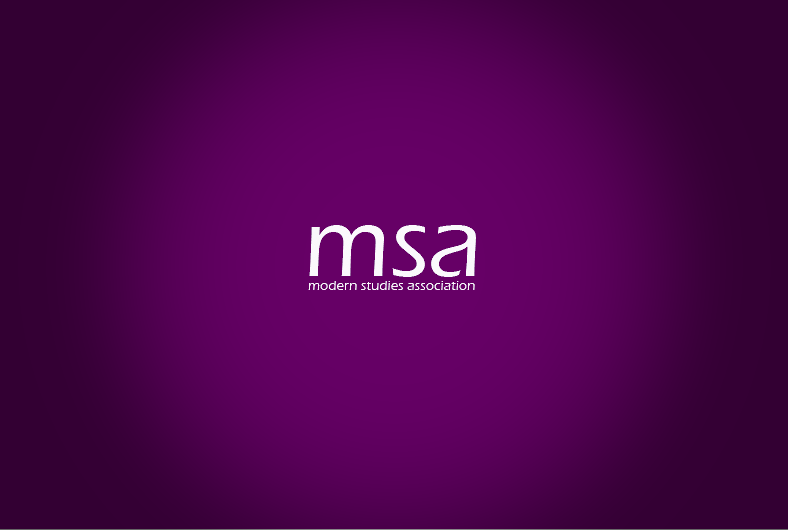

With ongoing restrictions placed upon peoples’ leisure, movements and work patterns to minimise the spread of COVID-19, the Modern Studies Association (MSA) has decided to hold our Annual Conference virtually for 2020.
Usually, Annual Conference is held in either Edinburgh or Glasgow, on the first Saturday each November, and serves as an enjoyable CLPL and networking opportunity for Modern Studies teachers.
However, given restrictions aimed at limiting the spread of Coronavirus are likely to continue for some time, the MSA’s National Committee has approved plans to hold the 2020 conference virtually.
At present, we are examining how Annual Conference – #MSA2020 – will work in a virtual landscape. However, we intend that the day will mirror our conventional conferences as much as possible.
We are planning for keynote speakers to deliver presentations based around a selection of course topics from National 5, Higher and Advanced Higher Modern Studies, with live chat to stand in for conventional chit-chat over coffee and bacon rolls.
It is also hoped that virtual stallholders will be on hand to answer members’ questions, and offer exclusive digital content to support practitioners nationwide.
Given the time that will be required of our National Committee to organise #MSA2020, and the purchase of new technologies to support the running of the event, attendees will be asked to pay a notional fee of £10 to attend.
Further details of #MSA2020 will be published in due course, but until then, you are invited to save the date: Saturday 7th November 2020.

The Modern Studies Association (MSA) has today (23rd August) published our response to the SQA’s ongoing consultation on how assessments for National 5, Higher and Advanced Higher Modern Studies could look for the 2020-2021 session.
On 14th August, the SQA published proposed amendments to the way candidates be assessed in the 2020-2021 session, given the ongoing COVID-19, and potential for future disruption to learning and teaching across the country.
Alongside a technical guidance document, which sets out the SQA’s proposed assessment arrangements for all NQ courses, interested parties have also been invited to complete an online consultation. The deadline for completing this online consultation is 24th August.
As part of the proposed adjustments for National 5 Modern Studies, the SQA is suggesting that candidates are given further optionality in six mark questions. The SQA’s technical guidance suggests that there will be two options for each 6-mark question in next year’s exam, giving candidates the opportunity to decide which one they’ll answer.
The SQA argues that optionality already exists with the 8-mark questions in National 5 Modern Studies, and that by extending this to 6-mark questions will help candidates who might have missed course content. There is no proposal to amend or otherwise remove the Assignment, at this point.
For Higher Modern Studies, the SQA is proposing that candidates are given more optionality for all sections of Paper 1. The SQA’s technical guidance proposes that there be 4 questions for Section 1 of the paper, while Sections 2 and 3 could offer candidates 3 questions.
In a similar move to National 5, the SQA proposes that no changes are necessary for the Assignment, which “lends itself to blended learning”, according to the technical guidance document. There are no proposals to change Paper 2 of Higher Modern Studies.
At Advanced Higher, the SQA now proposes that candidates are offered two extended response questions for each topic, with candidates still expected to complete two separate topics. There are no proposed amendments to the methodology questions or dissertation.
Those interested can access the SQA’s technical guidance document here, while the survey can be completed via this link.
The MSA’s response to the consultation was agreed at a National Committee meeting on 22nd August, with the full text of our response shown below.

As part of the ongoing public health situation, the SQA has published proposed amendments to the way candidates be assessed in the 2020-2021 session.
Given the inequitable circumstances which education found itself in during lockdown, and on the ongoing potential for candidates and teachers alike to self-isolate, as well as centres closing for deep cleaning, the SQA is seeking peoples’ views on how assessment might look over the next year.
The SQA has published a technical guidance document which sheds light on their proposals for assessment in each National Qualification subject in 2020-2021. Anyone who is interested can then respond via the official survey.
People who might wish to participate in the consultation have until Monday 24th August 2020 to complete the online survey.
As part of the proposed adjustments for National 5 Modern Studies, the SQA is suggesting that candidates are given further optionality in six mark questions. The SQA’s technical guidance suggests that there will be two options for each 6-mark question in next year’s exam, giving candidates the opportunity to decide which one they’ll answer.
The SQA argues that optionality already exists with the 8-mark questions in National 5 Modern Studies, and that by extending this to 6-mark questions will help candidates who might have missed course content. There is no proposal to amend or otherwise remove the Assignment, at this point.
For Higher Modern Studies, the SQA is proposing that candidates are given more optionality for all sections of Paper 1. The SQA’s technical guidance proposes that there be 4 questions for Section 1 of the paper, while Sections 2 and 3 could offer candidates 3 questions.
In a similar move to National 5, the SQA proposes that no changes are necessary for the Assignment, which “lends itself to blended learning”, according to the technical guidance document. There are no proposals to change Paper 2 of Higher Modern Studies.
At Advanced Higher, the SQA now proposes that candidates are offered two extended response questions for each topic, with candidates still expected to complete two separate topics. There are no proposed amendments to the methodology questions or dissertation.
Those interested can access the SQA’s technical guidance document here, while the survey can be completed via this link.

The SQA has today (4th August) published attainment data for Modern Studies, as candidates across the country receive their results by e-mail, post and text message.
Given the public health situation, this year has been like no other for candidates and teachers across the country, with exams cancelled for the first time ever.
As part of the alternative arrangements for certification this session, the SQA asked centres to produce estimated bands for all of their candidates, refine these bands, and then rank candidates within each refined band.
Today, as part of the attainment data published by the SQA, the extent of the moderation undertaken around teacher estimates has been revealed for all subjects.
In National 5 Modern Studies, 40.4% of candidates were estimated an ‘A’; 24% a ‘B’; 24.3% a ‘C’; 7.9% a ‘D’; and, 3.3% were estimated to have achieved no award at all. The SQA has moderated these to: 31.5%, 24.3%, 20.6%, 13.9%, and 9.8%.
At Higher, 43.5% of Modern Studies candidates were estimated an ‘A’; 25.6% were estimated a ‘B’; 21.3% a ‘C’; 6% a ‘D’; and, 2.6% were estimated to have not achieved an award. The SQA ended up awarding 35.7% of candidates an ‘A’; 24.8% a ‘B’; 19.2% received a ‘C’; 11.8% a ‘D’; and, 8.5% failed.
Teachers estimated that of Advanced Higher candidates, 40.1% would achieve an ‘A’; 30.8% a ‘B’; 20.9% a ‘C’; 5.9% a ‘D’; and 2.4% would receive no award. The SQA’s moderation changed these to 33.5%, 29%, 19.4%, 10.4% and 7.7%, respectively.
You can read the SQA’s moderation report for each level by clicking the links below.